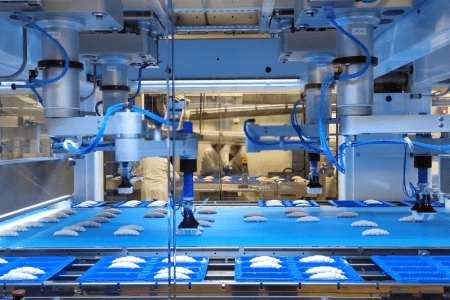International Bakery sits down with Stefan Capelle, Business Unit Director at Puratos and talk about how sourdough is growing in popularity and uniting bread businesses across the globe.
Tell us briefly about Puratos – it’s vision for the future – and how your role is integral to contributing to this?
Puratos is a family-owned company with headquarters based in Belgium, near Brussels. We are a purely B2B company specialising in the production and commercialisation of ingredients for bakery, patisserie and chocolate.
My role at Puratos is to manage the worldwide business for sourdough and grains. Something I have grown into over the last 22 years at Puratos. I have always been passionate about natural fermentation. Being Belgian, beer fermentation was always close to my heart. During my studies at the University of Ghent, where I studied bio-engineering and industrial microbiology, I met the wonderful world of bread: very closely linked to the tradition of beer, but still fundamentally different because of mainly the fermentation.
Sourdough has increased in popularity recently, especially during lockdown, how did coronavirus impact the business?
Indeed, sourdough bread gained a lot of interest during lockdown as people started to bake at home. The search on the internet for how to make sourdough exploded. Sourdough is recognised by the majority of consumers as being healthier and tastier. Making sourdough bread requires a long fermentation process (about 20h). Lactic acid bacteria play a big role. We know these from many other traditional fermented foods and they are also key to a healthy gut microbiome. A healthy gut is the main driver of a good immune system, which is extremely important as the pandemic continues to thrive. Sourdough closes the loop.
We are in a major health crisis, people discover the taste and health benefits of sourdough during lockdown and bread becomes our best friend again. Not surprisingly, our sourdough business resisted the COVID-19 crisis very well. People are searching for more healthy food during this health crisis, so the demand for sourdough bread increased. However, not all bakers are specialists in controlling microbial fermentations. Remember, sourdough disappeared from the market because it was too complicated to control compared to the convenience of baker’s yeast.

How has ingredients developed in the bakery sector? What trends are you noticing?
I believe we put a lot of emphasis on health and well-being in the bakery sector. The consumer rediscovers the nutritional benefits of bread. There is a big request from the consumer’s side for transparency, simplicity and authenticity. Ingredients used in baking are more and more ‘clean label’ and inspired by nature. People look for more grains and seeds to improve nutritional value. But we have to go beyond just a grain and a seed… Fermenting them lactic acid bacteria in a sourdough unleashes the full potential of grains.
Another option is to sprout them. During sprouting, the enzymatic activity of the grain liberates all nutrition for the germ to grow. This is the right moment to eat and digest the grains. Fibres of the grains are very important for the transit. With the right sourdough fermentation, those fibres can become pre-biotic, which means they serve as food for our good gut microbes, boosting your immune system. Many new technologies help to deliver better bread to the consumer!
You travel a lot for your job and speak on your area of expertise at various events. Tell us the process of preparation for this and how you think educating the sector will help those in the industry understand and use fermented foods more.
At the very beginning, I discovered that people were sensitive to the vocabulary you use. The word “sourdough” (in English) was really perceived in the early days as very negative. Consumers or bakers were not interested in “sour” taste. Sour was only good for San Francisco bread or for rye breads. There was a very limited appreciation. Sourdough was misunderstood!

When preparing presentations, I focused on finding ways to talk about it in terms of natural fermentation, natural leavening of the dough, and explain how the different families of lactic acid bacteria make a positive contribution in other fermented foods. I illustrated the word sourdough in other languages such as “levain” in French or “masa madre” in Spanish or “lievito naturale” in Italian that has no sour connotation at all, but emphasises the traditional and natural way of leavening a dough.
When building the sourdough library, we added the angle of bread culture. A series of clips were made, showing how traditional breads are made. Suddenly, this opened a whole new potential for customers to talk about the story of their bread and increase this emotional bonding with the consumer. Today, we are taking this to the next level by showing the nutritional benefits of the long fermentation process of sourdough. We see more and more industrial bakeries applying a very long and controlled fermentation process, which contributes to the quality of bread. Sourdough has been left alone for a very long time. It even almost disappeared for a while, but now it is here to stay and play a crucial role in the breadmaking of the future.
What do you see for the future of bread production and are there any other trends you are noticing?
Over the last few years, there were many animated debates between large bakeries and small bakeries, the latter claiming that industry is destroying their business. I do not believe in this distinction. We should start from the needs of consumers and reflect on short versus long fermentation processes. When thinking about their needs for quality and nutrition, I believe they would opt for long fermentation! It does not matter if it is produced in big scale or small scale. Both should produce better bread and serve the ever-growing world population searching for more nutritious and better tasting bread. They have a common goal. Artisans alone will not be able to serve everybody around the globe and industry will always face the disadvantage of not having the direct conversations with consumers, nor the flexibility to adapt quickly to new trends.
Another trend that might further grow soon is the focus on local ingredients. We see the disadvantages of globalisation in terms of climate change, food safety and health. ‘Going local’ allows for an improved sustainability and well-being. This is why Puratos invests in local ingredient production in many countries.






